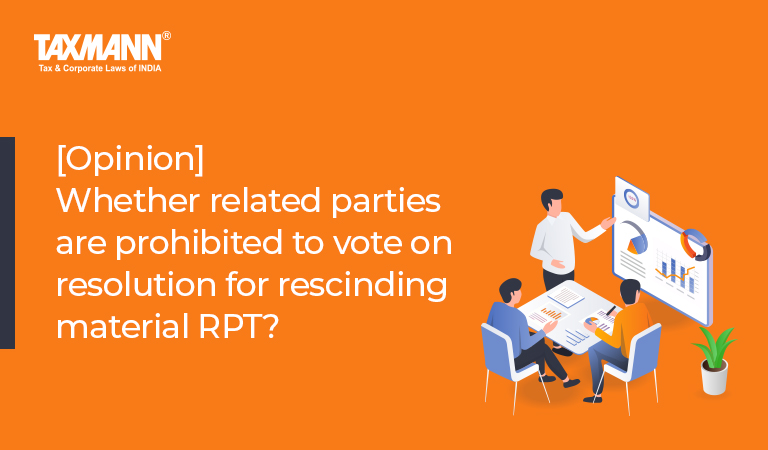[Opinion] Whether related parties are prohibited to vote on resolution for rescinding material RPT?
- News|Blog|Company Law|
- 3 Min Read
- By Taxmann
- |
- Last Updated on 29 July, 2022

[2022] 140 taxmann.com 589 (Article)
Voting by related parties on related party transactions (‘RPTs’) has been a controversial issue since Companies Act, 2013 (‘the Companies Act’) has been introduced. Such prohibition on voting was not there under Companies Act, 1956. This article is an analysis of a case wherein the provisions under the Companies Act and Regulation 23 of the SEBI (Listing Obligations and Disclosure Requirements) Regulations, 2015 (‘SEBI Listing Regulations’) were interpreted with respect to prohibition on voting on resolution for rescinding material RPTs.
Board approval under the Companies Act for RPTs:
Primarily, the consent of board of directors is required at a board meeting (i.e. not Circular Resolution) for a company to enter into certain transactions with related parties. The prescribed transactions are defined in section 188(1) of the Companies Act and related parties are defined in section 2(76) of the Companies Act. Where any director is interested in any contract or arrangement with a related party, such director shall not be present at the meeting during discussions on the subject matter of the resolution relating to such contract or arrangement.
Shareholders’ approval under the Companies Act for RPTs:
Acompany shall obtain prior approval of the shareholders by ordinary resolution for entering into contract or arrangement that exceeds prescribed thresholds (as provided in corresponding Rules). According to the Companies Act, member of the company shall not vote on such ordinary resolution, to approve any contract or arrangement which may be entered into by the company, if such member is a related party. However, such prohibition shall not apply to a company in which 90% or more members, in number, are relatives of promoters or are related parties. Also, the said prohibition is not applicable to private companies.
The requirement of approval of shareholders is not required for the transactions entered into between a holding company and its wholly owned subsidiary (whose accounts are consolidated with such holding company and placed before shareholders at general meeting for approval).
The provisions of section 188 of the Companies Act are not applicable to any transactions entered into by the company in its ordinary course of business other than transactions which are not on arm’s length basis. The Act has not defined ‘ordinary course of business’, therefore, this decision is to be taken by the board of directors/Audit Committee. The expression ‘transactions on arm’s length basis’ has been defined to mean a transaction between two related parties that is conducted as if they were unrelated, so that there is no conflict of interest.
Requirement of shareholders’ approval under SEBI Listing Regulations:
According to the extant Regulation 23 of the SEBI Listing Regulations, a transaction with a related party (as defined in Regulation 2(1) (zb) of the SEBI Listing Regulations) shall be considered ‘material’, if transaction(s) to be entered into individually or taken together with previous transactions during a financial year, exceeds Rs. 1,000 crore or 10% of annual consolidated turnover of the listed entity as per the last audited financial statements of the listed entity, whichever is lower.
A transaction involving payments made to a related party w.r.t. to brand usage or royalty shall be considered ‘material’ if the transaction(s) to be entered into individually or taken together with previous transactions during a financial year, exceed 5% of annual consolidated turnover of the listed entity as per the last audited financial statements of the listed entity.
Voting under SEBI Listing Regulations:
All material RPT and subsequent material modifications (as defined by the audit committee) shall require prior approval of the shareholders through ordinary resolution. Further, the related party shall not vote to approve such resolutions, whether the entity is a related party to the particular transaction or not.
This article is summary and analysis of the observations of the SEBI, Securities Appellate Tribunal and Supreme Court in the case of R.T. Exports Limited, with respect to the prohibition on voting on resolution for rescinding material RPT.
Click Here To Read The Full Article
Disclaimer: The content/information published on the website is only for general information of the user and shall not be construed as legal advice. While the Taxmann has exercised reasonable efforts to ensure the veracity of information/content published, Taxmann shall be under no liability in any manner whatsoever for incorrect information, if any.

Taxmann Publications has a dedicated in-house Research & Editorial Team. This team consists of a team of Chartered Accountants, Company Secretaries, and Lawyers. This team works under the guidance and supervision of editor-in-chief Mr Rakesh Bhargava.
The Research and Editorial Team is responsible for developing reliable and accurate content for the readers. The team follows the six-sigma approach to achieve the benchmark of zero error in its publications and research platforms. The team ensures that the following publication guidelines are thoroughly followed while developing the content:
- The statutory material is obtained only from the authorized and reliable sources
- All the latest developments in the judicial and legislative fields are covered
- Prepare the analytical write-ups on current, controversial, and important issues to help the readers to understand the concept and its implications
- Every content published by Taxmann is complete, accurate and lucid
- All evidence-based statements are supported with proper reference to Section, Circular No., Notification No. or citations
- The golden rules of grammar, style and consistency are thoroughly followed
- Font and size that’s easy to read and remain consistent across all imprint and digital publications are applied



 CA | CS | CMA
CA | CS | CMA
